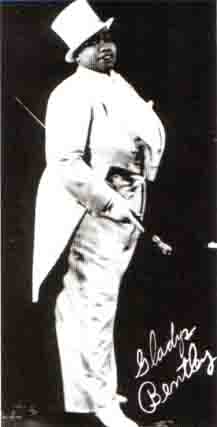Gladys Bentley

Gladys Bentley (12 August 1907-18 January 1960) was a famous butch lesbian African-American Blues singer during the Harlem Renaissance.
Bentley was born in Philadelphia, Pennsylvania, the daughter of American George L. Bentley and his wife, a Trinidadian, Mary Mote. She appeared at Harry Hansberry's "Clam House" on 133rd Street, one of New York City's most notorious gay speakeasies, in the 1920s, and headlined in the early thirties at Harlem's Ubangi Club, where she was backed up by a chorus line of drag queens. She was a 250 pound bulldyke, dressed in men's clothes (including a signature tuxedo and top hat), who played a mean piano and sang her own obscene lyrics to popular tunes of the day, in a deep, growling voice, flirting outrageously with women in the audience. On the decline of the Harlem speakeasies with the repeal of prohibition, she relocated to southern California, where she was billed as "America's Greatest Sepia Piano Player", and the "Brown Bomber of Sophisticated Songs". She was frequently harassed for wearing men's clothing. She claimed that she had married a white woman in Atlantic City.
Fictional characters based on Benlty appeared in Carl Van Vechten's Parties, Clement Woods's Deep River, and Blair Niles's Strange Brother. She recorded for the OKeh, Victor, Excelsior, and Flame labels.
During the McCarthy Era, she started wearing dresses, married a man, and studied to be a minister. She died, aged 52, from pneumonia.
Venues
Gladys Bentley appeared at:
- Clam House - New York
- Ubangi Club - New York
- Joquins' El Rancho - Los Angeles
- Mona's Club 440 - San Francisco
References
- http://lesbianlife.about.com/od/lesbiansinhistory/p/GladysBentley.htm
- http://members.tripod.com/~laurencefrommer/celebrity/celebrity2bentley.html
- Eric Garber, Hidden from History : Reclaiming the Gay and Lesbian Past
- http://www.queerculturalcenter.org/Pages/Bentley/Index.html
